Kataifi Pastry (also known as Shredded Phyllo Dough and Kadaifi) is a popular Middle Eastern pastry. It's used to make various delectable desserts, including cheese kunafa, bird nest baklava, and this Dubai chocolate bar recipe! Learn how to make this simple pastry dough at home with this easy 5-ingredient recipe.
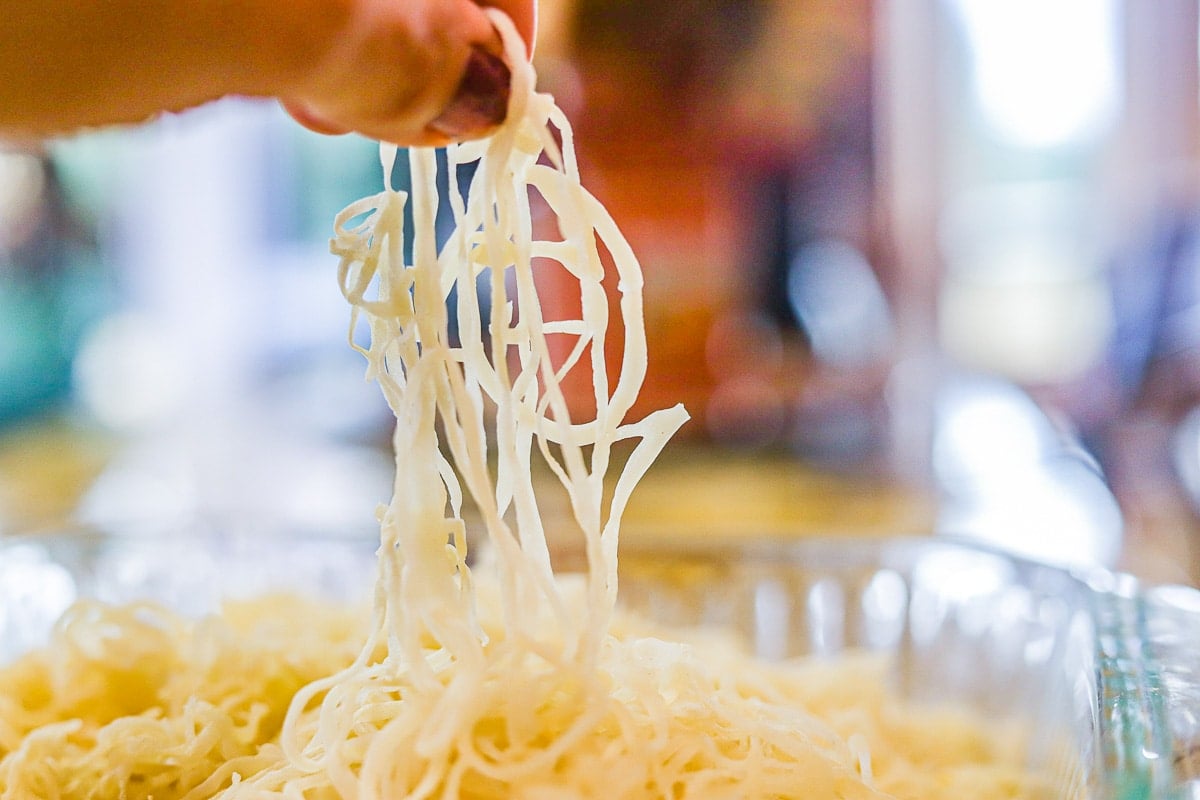
Besides the Middle East, Kataifi is also popular in the Mediterranean and Balkan regions (including Turkey and Greece), where desserts made with kataifi, like Kadayif, are quite popular!
This pastry has gained in popularity recently due to viral videos, where it is used along with pistachio cream to make Dubai chocolate-covered strawberries and an assortment of other Dubai chocolate-flavored treats.
Although kataifi pastry is commonly referred to as Shredded Phyllo Dough, that's not technically accurate. Unlike phyllo dough (paper-thin sheets of dough) Kataifi pastry is spun and sometimes compared to shredded wheat.
So, how do you make it at home? Easy! All you'll need is a large flat pan, a squeeze bottle, and a few simple ingredients.
Jump to:
😍 Why You'll Love This Recipe
- Kataifi is hard to find, especially in small towns. Making your own is a great way to still enjoy desserts that require it.
- It's cheaper to make it from scratch.
- This recipe only requires a few simple ingredients that almost everyone has at home.
- You can make it ahead of time and freeze it until you need it!
🔖 Ingredient & Substitutions
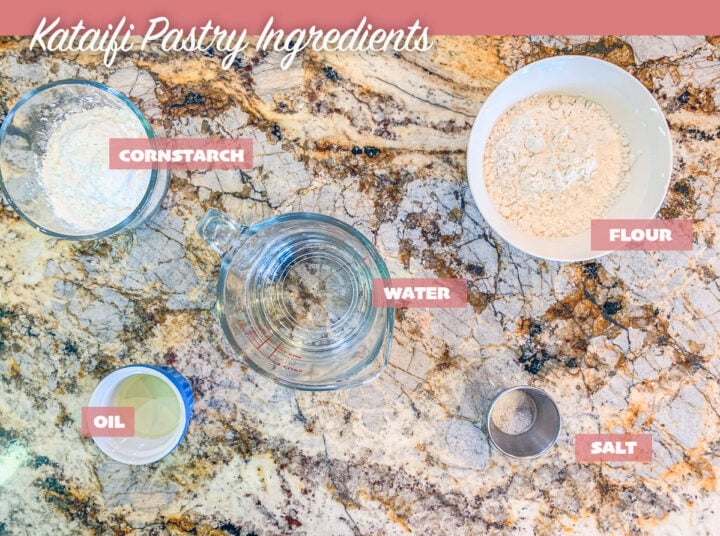
- Flour: I use all-purpose white flour in the batter. I have not tried the recipe with other flours so I can't say with certainty if they would work or not.
- Oil: Vegetable works well in this recipe and does not impart a strong flavor like, for example, olive oil would.
- Salt: I prefer sea salt.
*Find a full list of ingredients in the recipe card below.
🍰 How to Make Kataifi
Step 1: Whisk flour, cornstarch, and sea salt in a medium-sized mixing bowl.
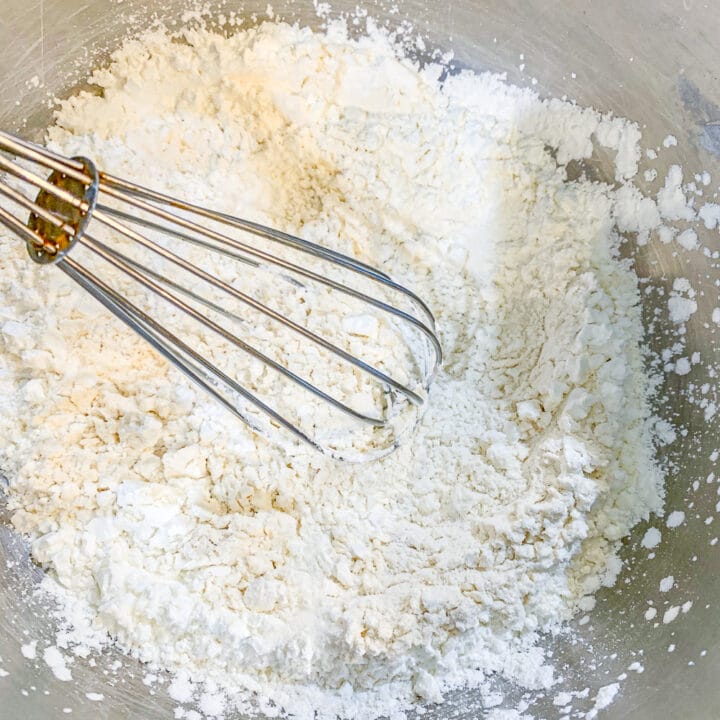
Step 2: Add oil and water and whisk until smooth.
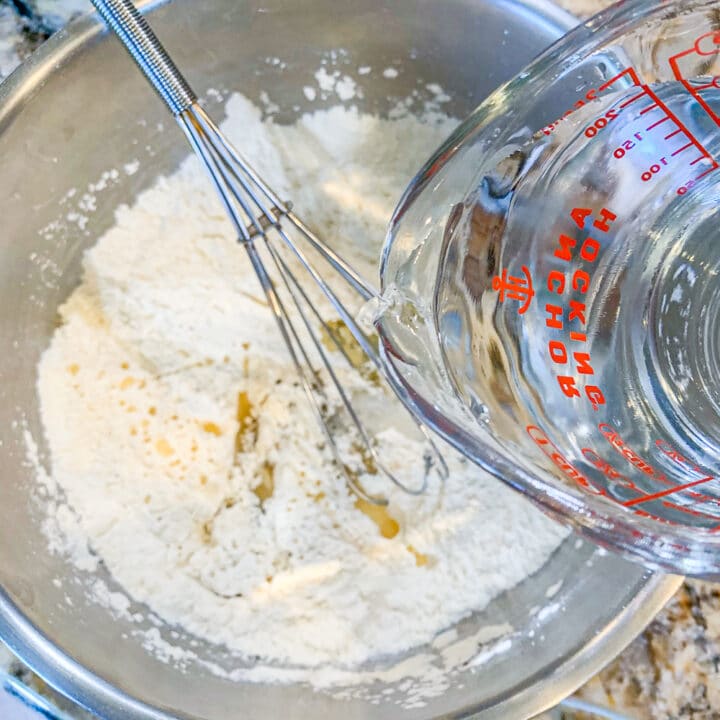
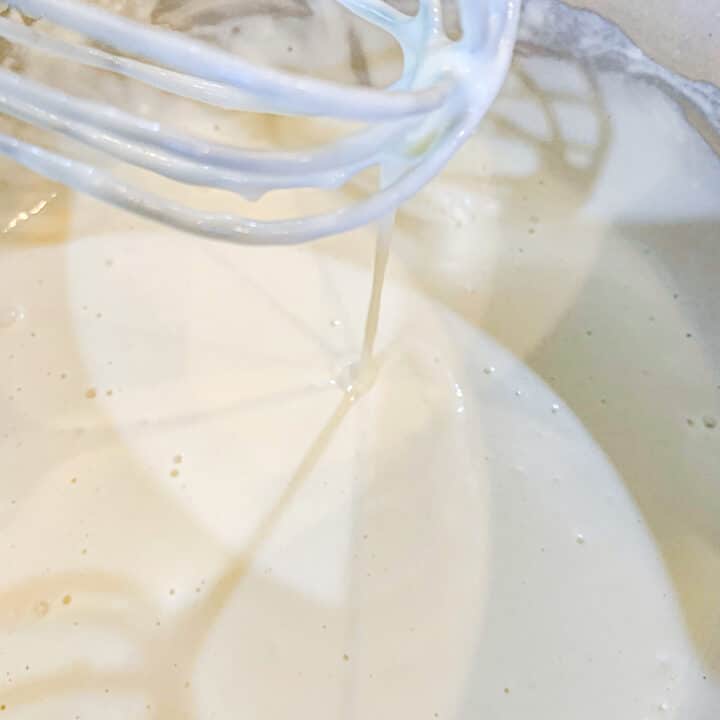
Step 3: Strain the batter through a sieve to make sure the batter is lump-free.
Would you like to save this recipe?
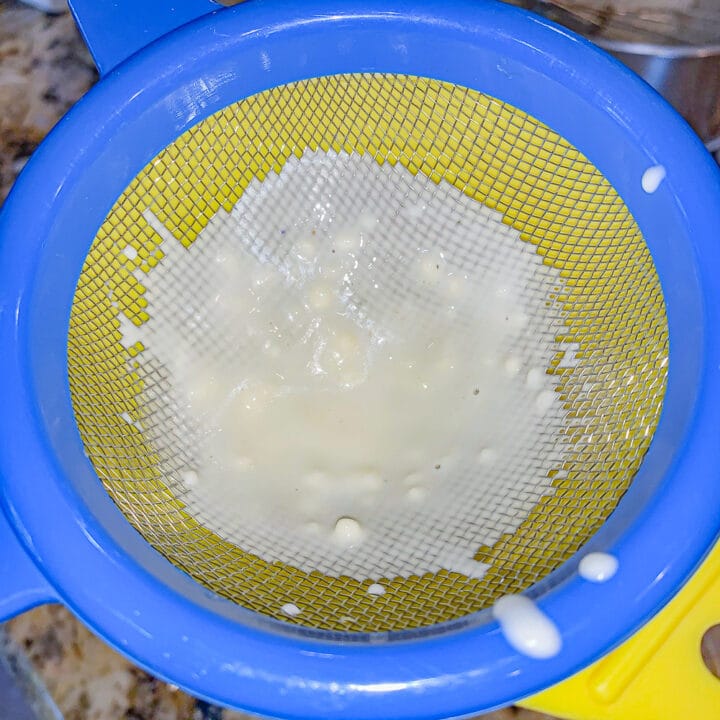
Step 4: Pour the batter into a squeeze bottle with a very small hole cut into the top.
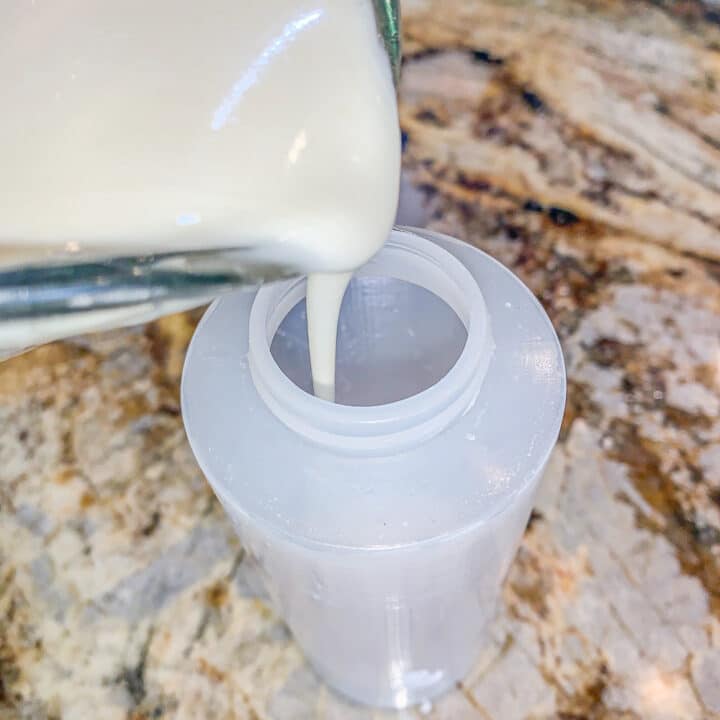
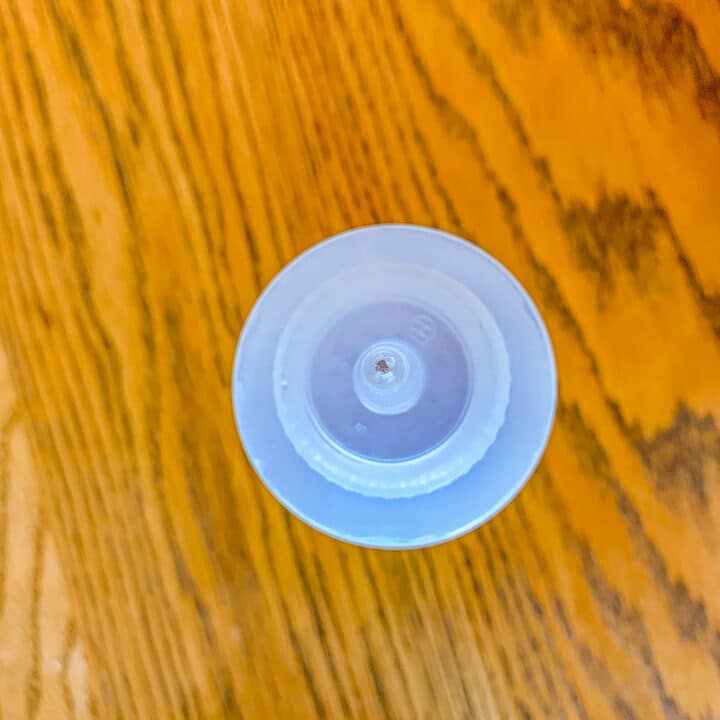
Pro Tip: The size of the hole is very important. If it's too large, the strands of Kataifi will be too thick. You want them as thin as possible.
Step 5: Heat a non-stick pan over medium heat until it's very hot. Gently squeeze the bottle to dispense a very thin stream of batter in a circular motion, starting from the center of the pan and working toward the edge of the pan.
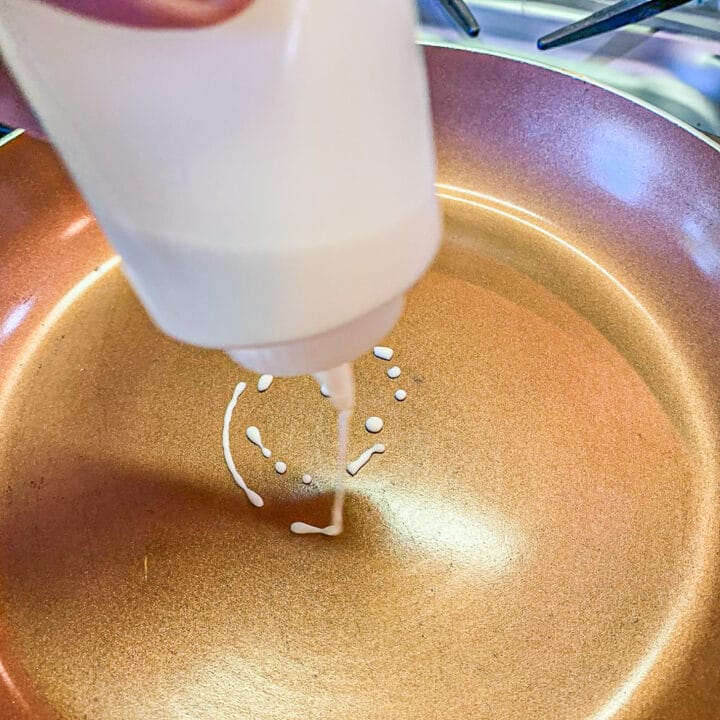
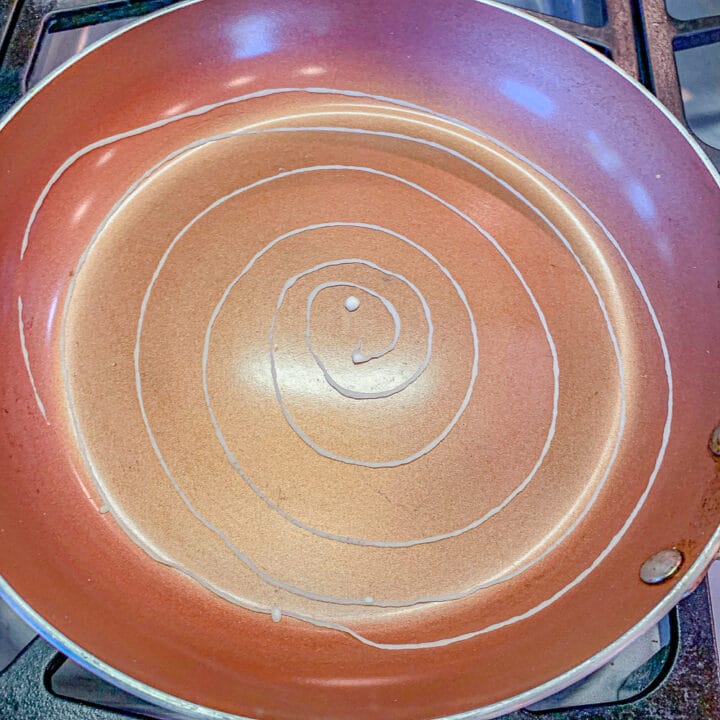
Pro Tip: After 5 to 10 seconds, the pastry will begin to peel off of the pan. Once it does, gently pick it up with a spatula and drop it into a bowl. Cover the bowl with a damp towel and continue this process until all the batter is used up.
Step 6: Shred the strands into smaller sections before using them in your baklawa, Kanafeh, or Kadaif recipe.
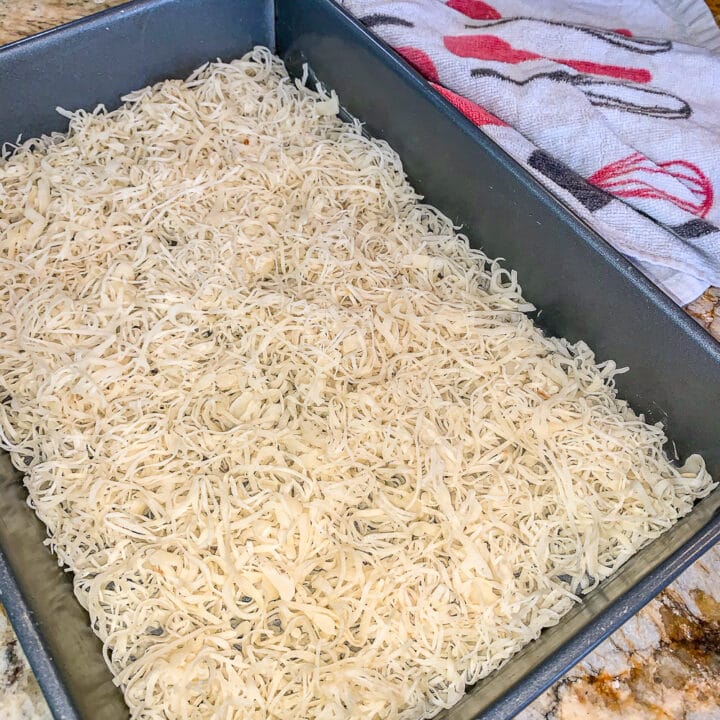
Looking for other easy recipes? Be sure to try my new puff pastry baklava recipe!
What Readers Are Saying
This recipe was really easy and delicious. It took me only 30 minutes as said. I tried it with gluten free flour instead of regular, and it turned out the exact same! The batter did what it was supposed to! Thanks for the outstanding recipe.
—Rydia
🤷🏻♀️ Recipe FAQs
Kataifi Pastry is made with a mixture of flour, cornstarch, salt, oil, and water. This thin batter is then spun to make the pastry's fine strands.
Yes, you can freeze Kataifi. In fact, when purchasing Kataifi, it is usually found in the frozen aisle of your grocery store. It is recommended that the frozen pasty is not defrosted on the counter, but instead, overnight in the refrigerator.
There seems to be a misconception that you can make Kataifi by shredding phyllo dough. However, phyllo dough and Katiafi are two different products and you can't make one with the other.
Phyllo dough is made with a dough that is rolled out into very thin and delicate sheets. Kataifi is made with a batter that is spun into fine strands that look similar to vermicelli.
Kataifi is usually used to make Middle Eastern and Greek desserts, including Baklava and cheese kunafa. Kataifi is used to make Turkish Sari Burma Baklava.
One way to use this "shredded dough" is to mix it with melted butter, then add half of it to a pan. Next, sprinkle the kataifi with chopped nuts (pistachios, walnuts, or almonds) and spices (cinnamon, cloves, and cardamom). The next step is to add the remaining Kataifi and bake it in the oven until golden brown. The final step is to drizzle the pan with cooled syrup made with honey, cinnamon sticks, cardamom, and cloves.
👩🏼🍳 Pro Tips
- Even though your dough might seem very smooth, you're going to want to strain it before transferring it to the squeeze bottle, otherwise, the tiny hole will get clogged.
- Keep in mind you want the strands to be as thin as possible. If you don't have a squeeze bottle, another option is to use a piping bag.
- If you notice that the pastry is brown when you remove it from the pan, it means the heat is too high and needs to be adjusted. The strands should remain white.
- If you dispense the batter side to side, instead of in a circular motion, the edges of the pastry will be too thick. For this reason, I recommend going in a circular motion instead.
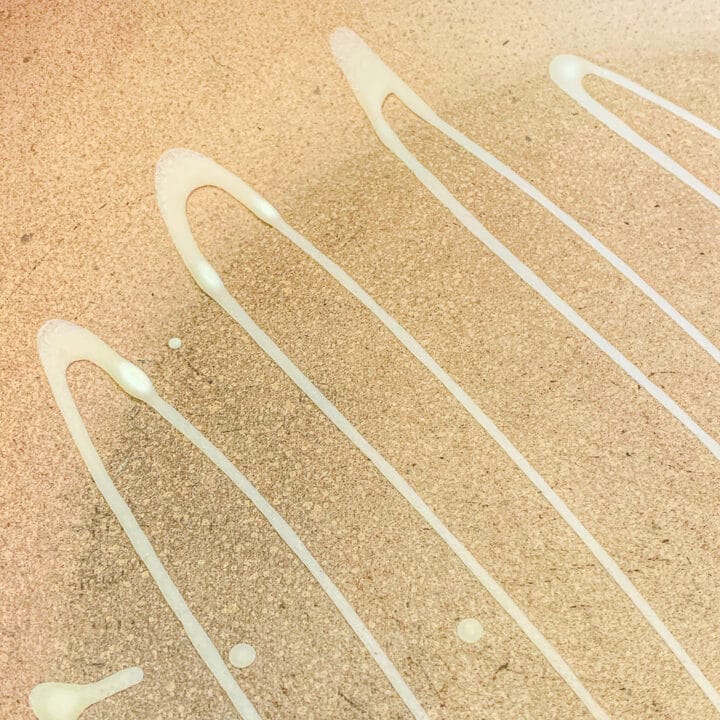
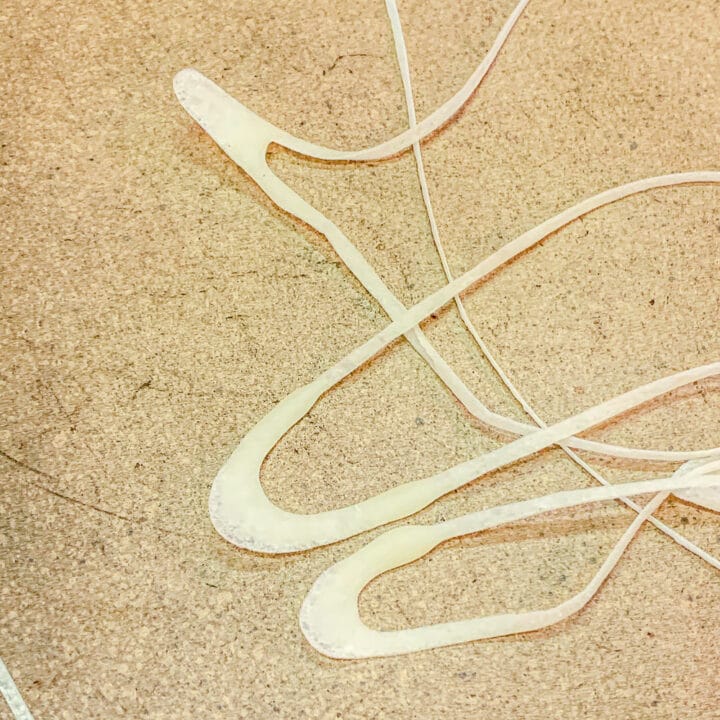
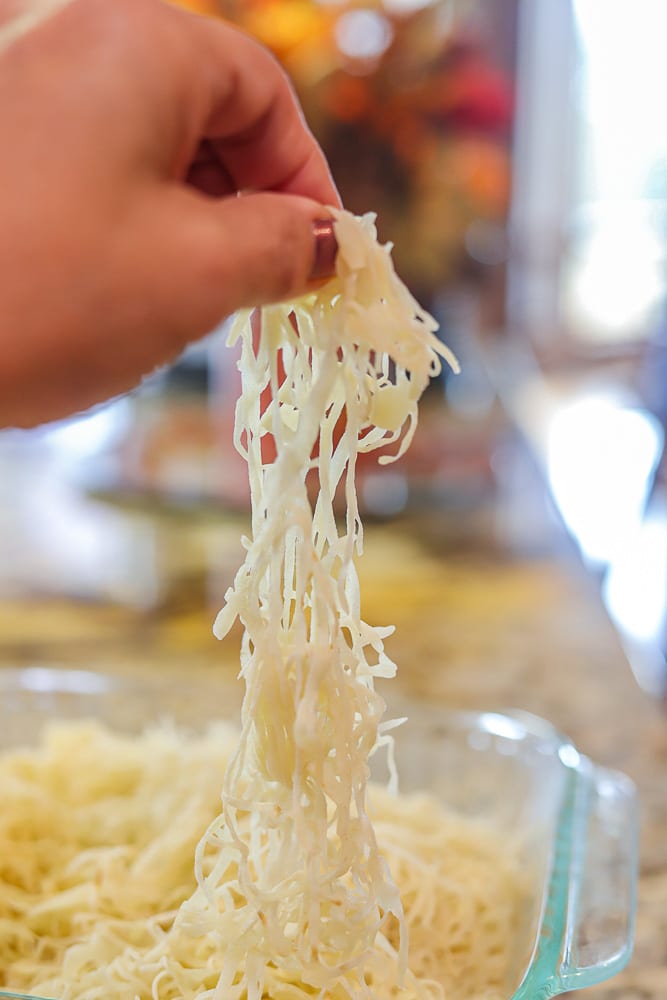
🥮 More Mediterranean Recipes
📖 Recipe
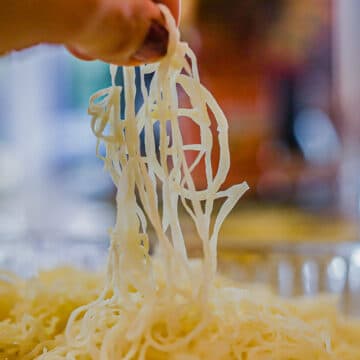
How to Make Kataifi Pastry From Scratch
Equipment
Ingredients
- 1⅔ cups all-purpose flour
- 1 cup cornstarch
- ¾ teaspoon sea salt
- 2 tablespoon vegetable oil
- 2 cups water
Instructions
- Whisk flour, cornstarch, and sea salt in a medium-sized bowl. Add oil and water and whisk until smooth.
- Strain the batter through a sieve to make sure the batter is lump-free. Pour the batter into a squeeze bottle with a very small hole cut into the top.
- Heat a non-stick pan over medium heat until it's very hot. Gently squeeze the bottle to dispense a very thin stream of batter in a circular motion, starting from the center of the pan and working towards the edge of the pan.
- After 5 to 10 seconds, the pastry will begin to peel off of the pan. Once it does, gently pick it up with a spatula and drop it into a bowl. Cover the bowl with a dishtowel and continue this process until all the batter is used up.
- Shred the strands into smaller sections before using them in your recipe.
Notes
- Even though your dough might seem very smooth, you're going to want to strain it before transferring it to the squeeze bottle, otherwise, the tiny hole will get clogged.
- Keep in mind you want the strands to be as thin as possible. If you don't have a squeeze bottle, another option is to use a piping bag.
- If you notice that the pastry is brown when you remove it from the pan it means the heat is too high and needs to be adjusted. The strands should remain white.
- If you dispense the batter side to side, instead of a circular motion, the edges of the pastry will be too thick. For this reason, I recommend going in a circular motion instead.

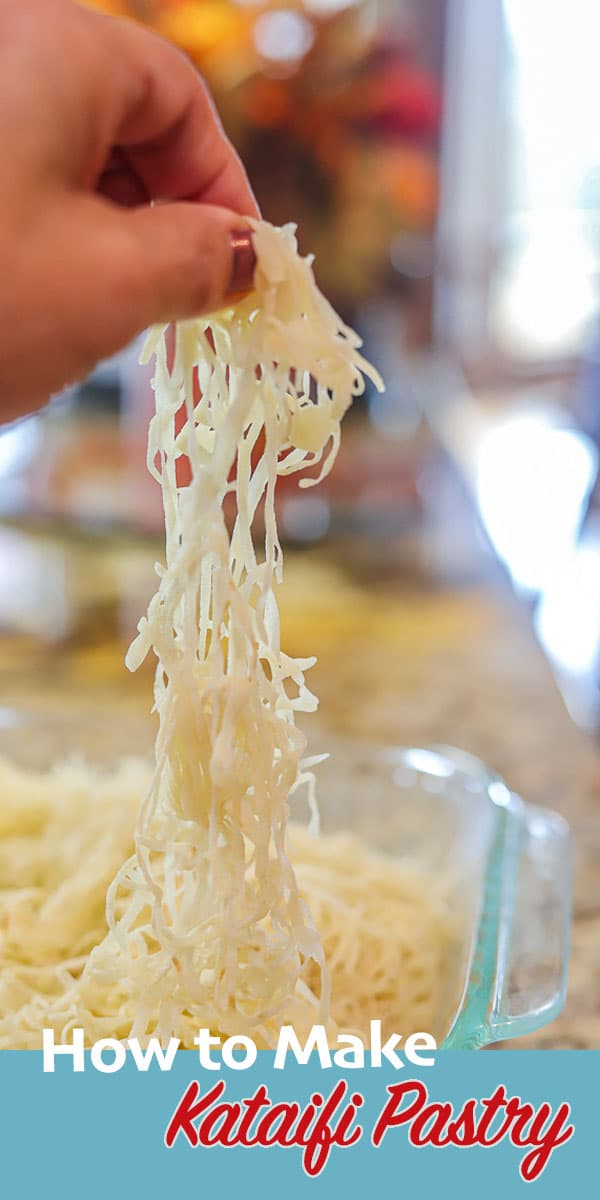
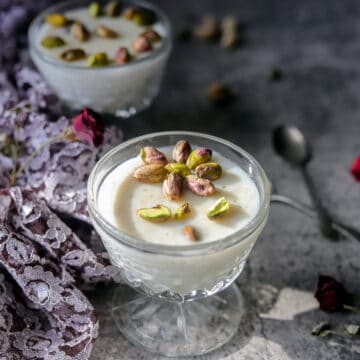
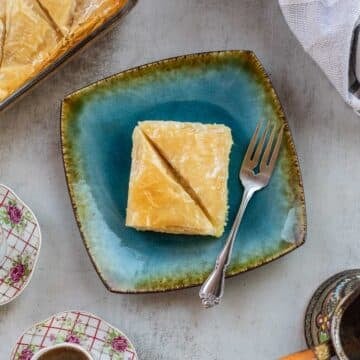
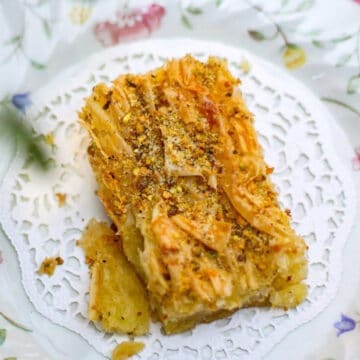
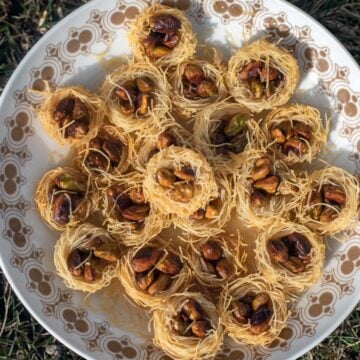
Margot Selig says
Hello. Would your kataifi recipe work with a gluten free flour? I have a family member who cannot tolerate gluten. I would use King Arthur or Bob’s Red Mill One For One flour or I would use a gluten free flour that you would recommend. Thank you.
Hilda Sterner says
Hi Margot, I've never tested it myself, but I have had readers say that they have made a gluten free version and that it does works great. This was Rydia's comment: This recipe was really easy and delicious. It took me only 30 minutes as said. I tried it with gluten free flour instead of regular, and it turned out the exact same! The batter did what it was supposed to! Thanks for the outstanding recipe.
Caeli Millett says
Hi! I was wondering if since the Kataifi pastry is cooked and golden brown already, would I still be able to use it if I were to make Kataifi Shrimp? I would use your Kataifi pastry recipe and then roll it onto marinated shrimp and then bake it in the oven on 350 for 15 min.
Hilda Sterner says
Hi Caeli, Absolutely! The first step only partially cooks it, it stays soft and pliable. Once you bake it, it will turn golden brown, but I would baste it with butter.
Therese says
I made kataifi today to use tomorrow....should I refridgerate it overnight?
Hilda Sterner says
Hi Therese, Yes, you should!
Jo says
I tried your recipe when the shops were sold out of kataifi, and honestly I prefer yours to store brought. I use a bottle and swing it around without squeezing which produces the best result. It is time consuming but I enjoy the process. Thank you so much from
New Zealand x
Hilda Sterner says
Thanks, Jo! I will have to try your method, I bet it produces finer strands.
Alexis says
no sugar?
Hilda Sterner says
Nope!
Wendy C says
Hi Hilda,
I am so happy I found your page. I've been looking for the perfect kataifi recipe and I finally made it. It came out perfectly. I tried a pastry bag and a squeeze bottle. The pastry bag made real fine strings like I imagine would be store-bought but was hard to manage. The squeeze bottle was easier to manage but made slightly larger strings. I also used your tahini recipe. I happened to have pistachio cream but on future recipes, I will be using your recipe for that too. I'm making the Dubai Chicolate Bars tonight. I look forward to posting how they came out. Thanks for all you do.
Hilda Sterner says
Thank you so much Wendy. Your comment made my morning! 😘
Christina says
Hi I just stumbled upon this recipe, can I store the batter in the fridge for prep?
Hilda Sterner says
Yes, you can!
Mapu mansfield says
How long and where can you store Katsura?
Hilda Sterner says
It should be fine in the fridge for at least a few days, if not more!
Holly says
Hi! If I want to use this for making Dubai chocolate bars, should I toast it in a pan or in the oven until its golden after following this recipe? Or just use it as-is? I've seen most recipes require store-bought kataifi to be toasted prior to adding the pistachio cream. Thanks!
Hilda Sterner says
Hi Holly,
Yes, you'll want to toast it in butter then mix it with pistachio cream. I actually have a Dubia chocolate bar that shows exactly how to do this, which includes a detailed video. https://hildaskitchenblog.com/recipe/dubai-chocolate-bar-recipe/
Nani says
What other oil can I use instead of vegetable oil?
Thanks
Hilda Sterner says
Hi Nani, Any neutral oil will work. I like to use avocado oil.
Amelia Skowron says
Hello, Can I use potato starch instead of cornstarch?
Hilda Sterner says
Hi Amelia, I have never tried using potato startch so I really can't say. If you do end up trying it, please let us know how it goes. You can always do 1/4 of the recipe so you don't waste ingredients!
Imelda says
How do you store the kataifi
Hilda Sterner says
I usually make it just before using it, but if there is any leftover or if you want to make it ahead of time, you can freeze it!
Kelly Methey says
This Kataifi Pastry is so interesting to me. I love how it’s made and toasts up so nicely. It’s so good in both baklava and especially in the Dubai Chocolate Bars. It makes such a fantastic filling for the bars and it’s so nice that you can do it yourself and make it any time. It’s such a crunchy, versatile unique pastry.
Hilda Sterner says
So many people are under the impression that it's made by shredding phyllo dough (which is why it's often referred to as shredded phyllo dough). It's my mission in life to inform everyone how it's actually made, lol!